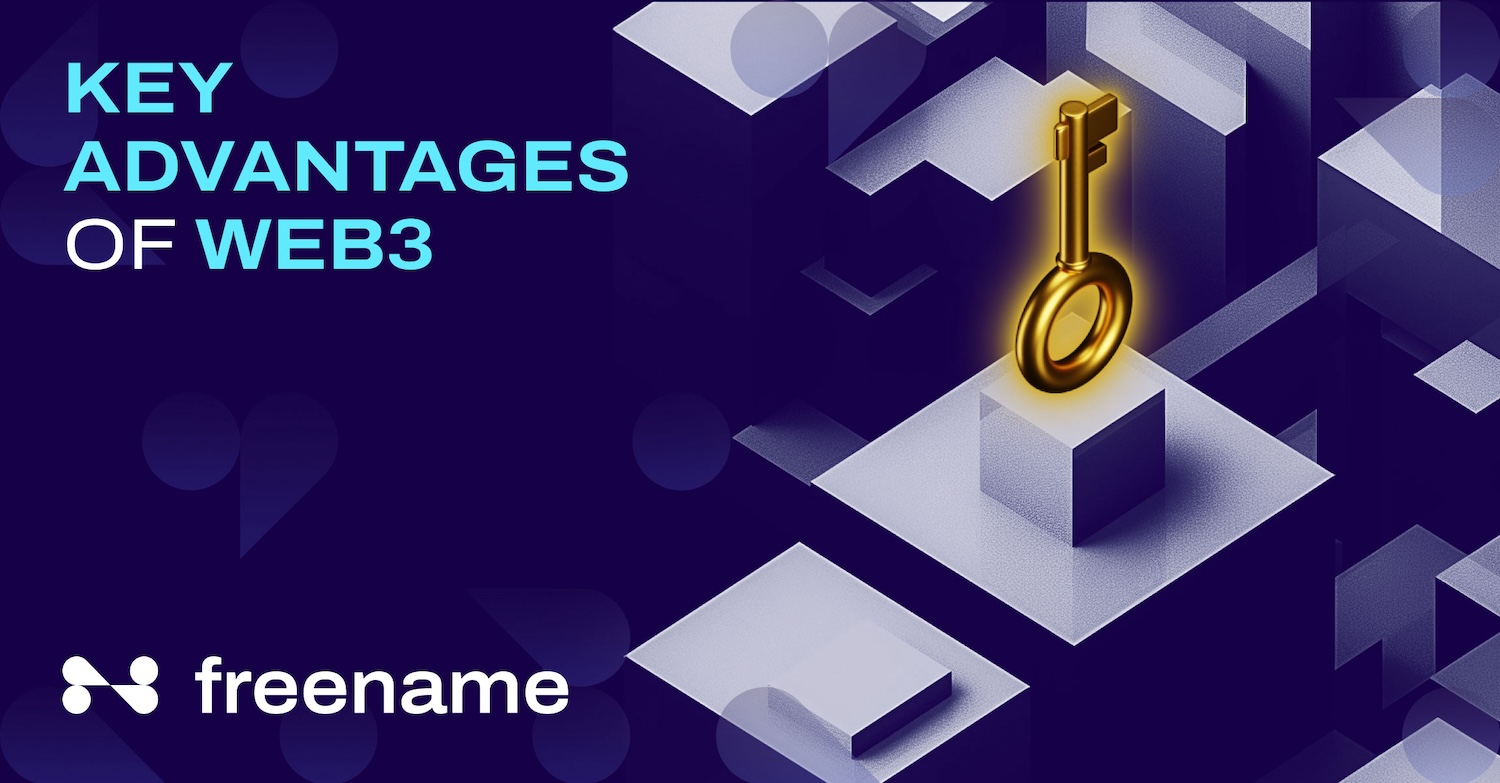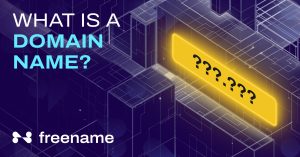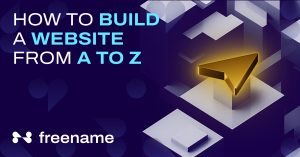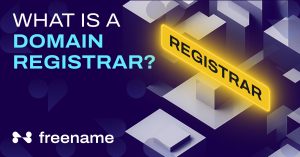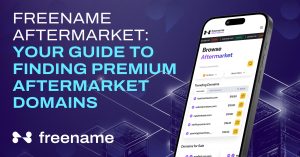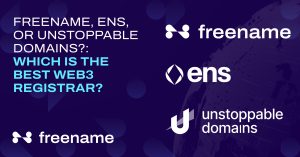In just a few decades, the internet has evolved so dynamically that we can now interact with tools, cars, and robots — and even automate tasks that we used to do repetitively.
First, there was Web 1.0, which provided a static interface, but there was no way to interact with the content. Then came Web 2.0 with a pool of social networks, apps, and websites that allowed us to engage with the content – and share it with others.
This era belongs to Web 3.0, where static to interactive content and everything in between is coupled with attributes like tamper-proof security, peer-to-peer connectivity, complete control over data, and privacy.
In this post, we’ll explore the advantages of Web3 and how it is making a huge impact on our lives. But first, let’s understand the concept.
What is Web3?
Think of a website, computer program, application, or NFT collection that only relevant users can access. Only a Web3 ecosystem can make it happen.
Web3 is an umbrella term encompassing everything launched, accessed, or interacted with using blockchain technology. From cryptocurrencies to open-source platforms, games, applications, images, audio, videos, and virtual real estate, everything stored on the blockchain is a Web3 property.
The Web3 ecosystem is powered by blockchain technology, which makes it highly secure for individuals and businesses alike. Moreover, it offers thousands of apps and protocols to interact with – and do it with just a single click.
Simply enter the address or Web3 domain name in your blockchain browser and get access to the concerned content. Similarly, you can save ample time on financial transactions using a Web3 (DeFi) app.
Besides the seamless experience, Web3 games offer effortless accessibility, which is something most Web2 games fail to deliver. Web3 games offer excellent cross-device compatibility, ensuring a seamless multiplayer experience.
This decentralized approach makes all of the above functionalities possible. There are no central servers; instead, local devices take the burden of storage, data identity, and verification. This democratization enables everyone to participate in making the Web3 internet better than before.
Web3 offers a wide range of benefits, which we will discuss below. Keep reading to find out.
Advantages of Web3 Across Areas of Life
Web3 offers both startups and established businesses the opportunity to build a strong decentralized portfolio for their products/services. With a relatively smaller budget, they can market their products more dynamically and gain more traffic, leading to better revenue propositions.
Let’s dive right in to know why opting for Web3 can be a life-changing decision.
Security
As discussed above, Web3 ensures security through blockchain technology.
The blockchain approach for data storage is different from two-step or three-step verification processes followed by traditional apps. It involves a complicated process to store the data on local devices rather than servers.
- Blockchain technology saves data and information in nodes (or blocks).
- The data is stored in bits and pieces across the complex network of local devices.
- Every block has a unique address, which is stored in a huge blockchain ledger. The address is a long cryptographic message with numbers, strings, and alphabets.
- Data retrieval or accessibility requires verification, taken care of by Smart Contracts; no human intervention is required.
This ensures that only the data producer has the power to share it with relevant people. The data owner can determine who the data is for and how they can access it.
Considering its security, Web3 is a must-have tool for securing private (or personal) data. While everyone can use it, Web3 would make an ideal choice for professionals such as designers, programmers, artists, data analysts, scientists, company owners, etc.
Decentralization
The decentralized approach differs from the Web2 approach, which leverages central servers to store all the information. If one node is down, it won’t affect the functions of the other nodes, ensuring tamper-proof data security.
Apart from high-end data security, the decentralized approach also enables blockchain users to perform business transactions or data sharing without third-party involvement.
In addition, Web3’s decentralized infrastructure is neutral and more credible. It lowers entry barriers for new businesses, resulting in more diversity in the online marketplace.
Web3 offers many self-finance opportunities for new businesses. For example, those in healthcare, financial services, and entities managing consumer data can leverage Web3’s tokenization approach to protect their sensitive information.
Tokenization involves replacing sensitive information with non-sensitive tokens. These tokens can be safely used without compromising the underlying data.
Anonymity
A potential benefit of Web3 is that users’ identities and digital ownership are concealed while buying and selling using blockchain technology. As the data control is decentralized, users are not required to supply their personal information, eliminating the need for intermediaries.
This is why the risk of data breaches and cyber theft is greatly reduced. Users are able to interact with dApps via anonymous wallets without revealing identities.
There are quite a few scenarios where anonymity is very important for the safety and security of an individual. These include:
- Financial transactions: Blockchain greatly reduces the risk of fraud because users don’t have to reveal their identity or have it verified by a third party.
- Healthcare: Patients can share medical records anonymously, ensuring privacy while seeking second opinions.
- Whistleblowing: Individuals can maintain anonymity while reporting misconduct, cybercrime, or an act of violence, where revealing their identity can put them in danger.
- Political Activism: Activists can communicate and organize without fear of government surveillance.
Freename offers a Web3 TLD called .anon that symbolizes anonymity. The TLD appeals to all those businesses and individuals, such as whistleblowers, anonymous content creators, and privacy advocates, who don’t like to reveal their original identities.
Readable Representation
Artificial Intelligence (AI) and Machine Learning (ML) also play an integral role in evolving the Web3 ecosystem. These technologies are able to automate complex tasks by analyzing large datasets, ensuring seamless data processing and user interaction.
Almost every decentralized platform is equipped with AI and ML for enhance efficiency and informed decision making. Whether it’s demand detection, understanding user intent, campaign’s performance assessment or gauging overall marketing efforts, AI-powered dApps have proven their effectiveness in every way.
Examples of current technologies:
- Wolfram Alpha: It is a high-end AI-powered tool to help you solve almost all kinds of problems related to home, education, and business.
- Chainlink: A popular AI tool for blockchain users, offering timely and accurate AI-powered data feeds for smart contracts.
- Fetch.ai: An ML-powered tool to support autonomous agents for transportation and energy distribution.
- Ocean Protocol: Offers AI-powered data monetization and ensures complete anonymity.
A New World, Metaverse
Is it possible to attend a concert with friends who live in different parts of the world – and all that, from the comfort of your living room? Can you try on clothes virtually before buying them? Metaverse can make it happen for you.
The Metaverse is an immersive virtual space that has revolutionized digital interaction by:
- Creating hyper-realistic experiences,
- Breaking down geographical barriers.
Imagine playing games with your friends in a virtual 3D world. Games like Decentraland, Minecraft, Axie Infinity, Alien Worlds, and The Sandbox have taken the online gaming experience to another level.
It’s still early, but current trends suggest that Metaverse will transform commerce. Today, virtual stores, digital assets, and new economics are emerging, blurring the lines between physical and digital.
Trading Cryptocurrency
As discussed, blockchain technology was initially used for cryptocurrency trading. This is the basic purpose of Web3 – rendering a decentralized, transparent, and secure environment where users can transact or trade without the involvement of a third party.
The information is verified and exchanged via a network of local devices, and anonymity is maintained. Some of the major features and benefits include:
- Decentralization: Users are in full control over their funds.
- Transparency: Public blockchain records all the transactions, making Web3 a trustworthy option.
- Security: Tamper-proofing and end-to-end encryption protect data and assets.
- Global Access: No geographical limitations; no time constraints.
- Innovation: Decentralized finance apps (DeFi) have surfaced, giving users a variety of trading options.
- Currencies: Besides popular currencies like Bitcoin, Ethereum, Solana and Cardano, new currencies have been developed for trading.
- Decentralized Governance: Democratic management structures, also known as DAO, have been developed to govern blockchain transactions.
Currently, central banks have no considerable role to play in cryptocurrency trading as Web3 is thoroughly decentralized. However, it is still evolving as many countries have stressed the need to develop rules and regulations for cryptocurrency trading.
Web3 TLDs and Domains: Royalties
Web3 offers a decentralized and neutral environment for content creators, traders, service providers, etc. They can create a unique Web3 identity by securing a Web3 domain (SLD or TLD) that can integrate with their wallets and other digital assets.
Web3 domains offer one-point access to the world of decentralized internet. They are in high demand because of their dynamics, long-term cost benefits, and affordable price tag.
Future Profits
Potential investors can utilize this neutral environment by buying decentralized domains at cheaper rates and selling them for high profits later on. These domains can be minted on different blockchain networks, such as Base, Polygon, Solana, Aurora, and more.
Passive Income
With Web3 domains, you have the option to create a passive income source. You can buy a Freename TLD and become a registrar. This way, any SLD that will be registered under your TLD will pay you a commission of up to 50%.
Conclusion
The Web3 ecosystem is more secure and interoperable and offers better opportunities for all kinds of businesses to thrive. In addition to foolproof security and high-level data privacy, it has many other features that set it apart from the traditional Internet.
You can build a portfolio for digital assets, interact with thousands of apps without add-ons or plugins, spend time with your friends in Metaverse, or trade cryptocurrency without human intervention. The decentralized web has you covered.
To get access to the unlimited decentralized internet, you need a Web3 domain. This way, you can give a unique identity to your digital assets or build a highly secure collaboration system for your company.
Moreover, you can invest in Web3 domains to get high profits in the future – or you can create a stream of passive income by becoming a domain registrar.

